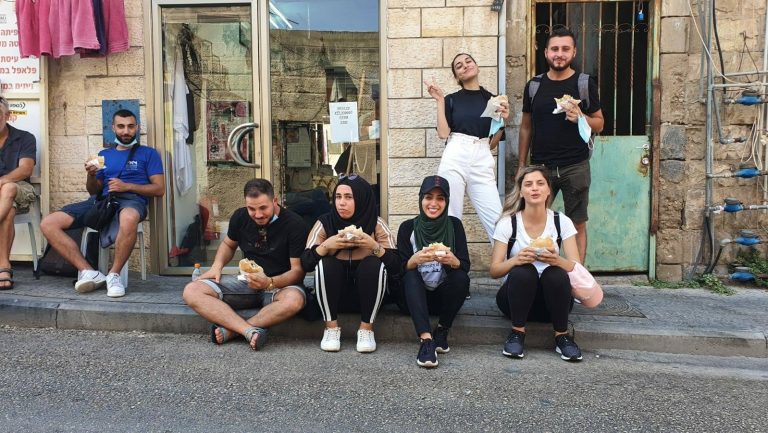Dr. Orit Fisher-Shalom, the lecturer of the “Israeli Society” course in the ‘Education and Community’ program Kinneret college, is facing a real academic challenge. She’s teaching a class of 70 students, both Jewish and Arab, and chose to put at the core of the course some of the most divisive issues facing Israeli society today. Of course, while moderating such discourses, some very elementary, yet tricky, questions arise: How is it even possible to initiate a meaningful, respectful and thorough discussion in such a large and diverse group? In which way would it be possible to make connections between this seemingly dry academic topic and the day-to-day lives of the students?
Dr. Fisher-Shalom chose, in our opinion, a brave and creative solution to these dilemmas. She chose to intertwine within the syllabus a variety of different workshops, in which the students participate as part of smaller, integrated Arab-Jewish groups. This enabled a well-moderated conversation, one that all the students would get the chance to participate in. We, at Mabat, were definitely on board for this challenge. So just like that, we arrived to Kinneret College first thing in the morning, accompanied by our magnificent and diverse team of group facilitators, to take part in the first workshop.
It may be worth mentioning that we’re not strangers to this academic institution, and have had the pleasure to work with Kinneret College on several other occasions as part of our mission to develop the multi-cultural discourse in Israel, enabled by the support of the U.S. Embassy to Israel.
We initiated the workshop by working on the students’ familiarity with one another.
We were a bit worried at first that our workshop may be a bit basic for the group, considering that they all choose to take a course like this, which shows that they are at least open to Arab-Jewish dialogue. We were relieved, however, to see that despite their impressive familiarity with multicultural issues and with one’s another’s cultures, the workshop still succeeded to challenge the students, take some of them by surprise, and introduce them to unfamiliar topics.
The main goal of the workshop was to better examine the connection between personal and cultural identities in relation to issues that challenge Israeli society. How is my personal identity being structured by my social and cultural circles? Where do these circles meet the wider multicultural discourse in Israeli society today?
‘Mentimeter’ is an app we use in our programs that enables us to ask questions to a group, and allowing group members to answer via their smartphones, while we see their answers on the main screen. For example, we just asked them – ‘What are your identities?’ Every one of the participants could have chosen up to five different identities , which then joined the mind-map being formed on the screen, where identities shared by many were written in a bigger font the more results they gathered.

After that, we turned to map our personal identity and social circles – the core belonging groups we are part of which shape our own personal and cultural identities. We asked the students to sketch themselves within the different circles and to share the drawings in smaller groups, so they could better understand both themselves and their peers. To make things even more complex, we suggested they add some symbols, rituals and cultural heroes to their maps, representing the core values cherished by the different groups.

Soon enough we realized that the same characteristics that define our personal identities are also the same characteristics that define Israeli society’s dividing conflicts. As such, for example, the self-identification of some of the students as Arab-Palestinian sparked some protest and discomfort among some of the Jewish students. However, within the safe space of our workshop, we were able to moderate a tense discourse in a respectful and civil way.

This opportunity for a well-tempered dialogue seems so basic, and yet, it’s most significant in practice, given the usual way that these discussions are held in greater Israeli society. In order to achieve this, we set norms and limits for discussions, norms that aren’t frequently seen in the average academic classroom. Of course, it also helped that we had the opportunity to work with smaller groups than usual. But the quality of communication that can be achieved by sitting in a circle, making time for lengthy discussions, careful listening and active participation, aren’t seen so frequently in the academic realm, and are crucial for multicultural efforts.
The students were extremely happy with this opportunity to discuss identity with others, diverse others, and we are so glad that we had the chance to be a part of this process.
—-
The ‘Mabat’ program at ‘Kinneret’ college is made possible by the support of the U.S. Embassy in Israel. We are keen to keep you updated on further developments soon.





